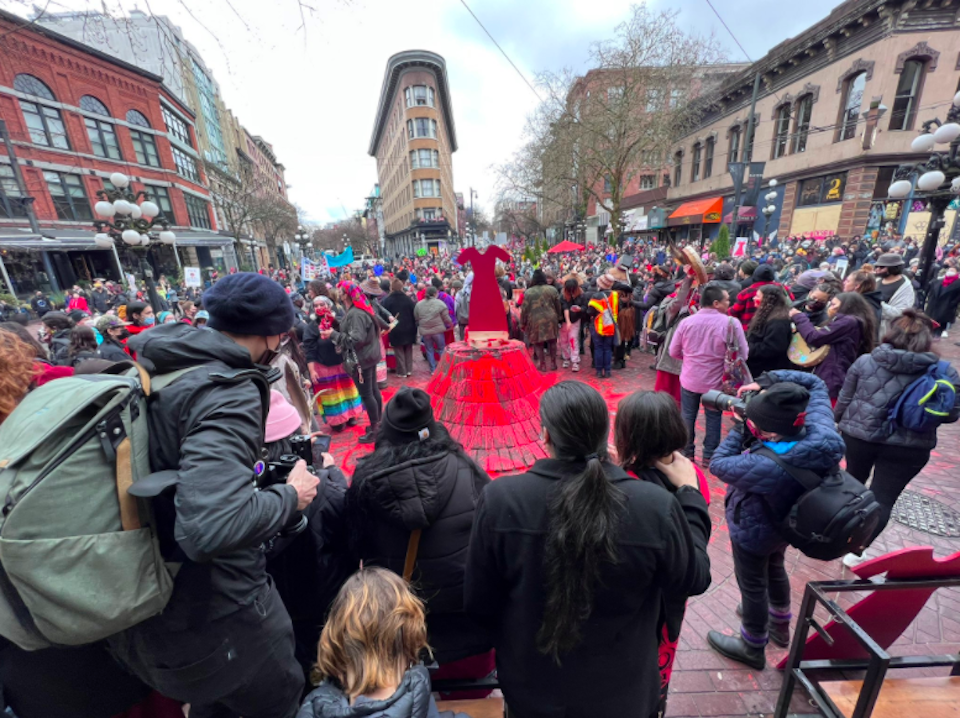In response to the toppling of Gastown’s Gassy Jack statue Monday (Feb. 14), Sḵwx̱wú7mesh Úxwumixw (Squamish Nation) has asserted its need to lead the work involving its ancestors and colonization through “respect and collaboration.”
In a statement by Nation Councillor and Spokesperson Wilson Williams Sxwíxwtn, the Nation noted it had previously come to an agreement with the City of Vancouver to remove the statue of John Deighton, who had married two Squamish women, one of whom was 12-year-old girl Kwahiliya (Madeline) in 1870.
With conversations to remove the statue beginning in 2020, the Nation said discussions were “ongoing, focused on a culturally safe and respectful process that would bring dignity and healing to all involved.”
“The Nation was in consultation with our community and the descendants of our respected ancestor Madeline - Gassy Jack's former wife. She was a courageous woman our Nation looks up to, and today has many descendants alive in our community. We are concerned about unsafe actions that risk people's personal safety and remain focused on supporting justice for Missing and Murdered Indigenous Women,” Williams wrote.
The monument at Maple Tree Square on the corner of Water and Carrall Streets was pulled down during the 31st annual Women’s Memorial March for Missing and Murdered Indigenous Women and Girls. In a statement, Vancouver police said as the march “wound past” the statue, “demonstrators tied ropes around the statue, then pulled it to the pavement and covered it in paint.”
Speaking to North Shore News, Williams said while the Nation doesn’t condone the act behind the toppling of the statue, “You certainly understand the anger behind it.”
While the issue of the statue is often focussed on Gassy Jack, Williams said Kwahiliya was a powerful and incredibly strong woman who should be held up in honour.
“She stood up for her rights and had the courage to leave Gassy Jack at the age of 14 or 15. She's a role model for our Nation and should be a role model for Indigenous women everywhere,” Wilson said. “Women are so powerful, and through our culture and teachings, and traditions, women are the whole heart of our Nation. They’re the matriarchs that bring us tomorrow.”
While a sense of urgency to remove the statue has been felt in some sections of the community, Williams said the City of Vancouver had honoured the Nation's recommendation that time be taken to “walk softly” and connect with the descendants of the family and the wider community respectfully, as to follow protocol and not retraumatize.
“We [also] wanted to make sure … we were fact finding in regards to not only the story of Gassy Jack himself, but also getting the true history behind the Squamish Nation women that he married.”
While there is no official timeline of what will replace the downed statue, Williams said Squamish teachings show that their ancestors “never rushed anything. Patience was ultimately the virtue here.”
“Some of our ceremonies sometimes took one to three days to conclude, you know, and that itself was the strength of our people paying the highest respect … and what it all comes down to is understanding and knowing who you are and where you come from, in order to know where you're going. And as stelmexw people, First Nations people, I think it bodes well with other First Nations communities across Canada.”
Williams said when the City of Vancouver was gifted Gassy Jack on Valentine’s Day in the early 1970s, something was missing.
“Squamish Nation wasn't in the room. The Host Nations, no Indigenous First Nation was in the room.
“Through the spirit of reconciliation today, I'm big on people having an open mind and open heart … We have a lot of challenging stories to share, and we have a lot of positive and constructive and good stories to share as well,” he said. “We have strong legends that connect us to the Earth from time immemorial … through reconciliation, it's evolving, we're not invisible in our own lands. And I feel that we have a voice and ultimately reconciliation is being able to educate people, but also providing a better place and teaching people to be better people.”
Williams said the Nation in due time will be providing the city with recommendations on what to do with the space where the statue once stood.
“Through the spirit of reconciliation, [it] could be inclusive and collaborative to, not just the Squamish Nation, but all First Nations. … We want something strong and symbolic and I think the people have an open heart and open mind, especially the City of Vancouver, to really collaborate with us.”


